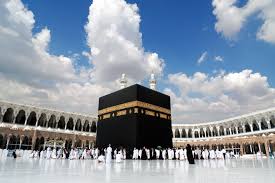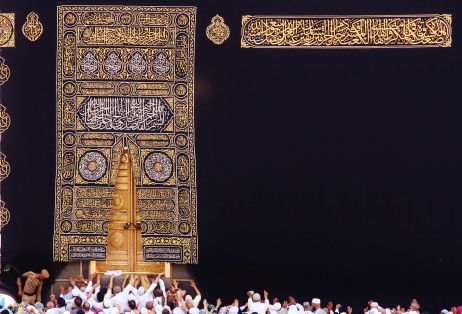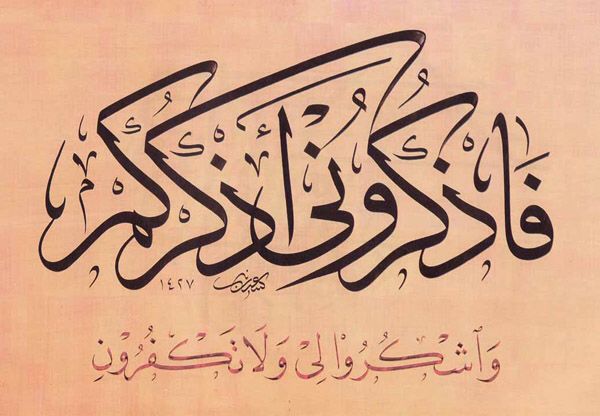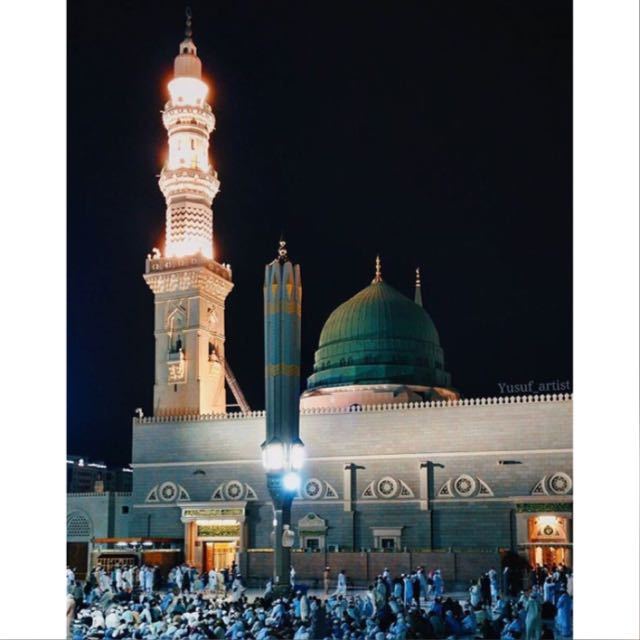بسم الله الرحمن الرحيم


This poem was written to inspire and increase our love for the Haramayn Shareefayn, to instil its beauty and dignity in our hearts. Allah accept my efforts and reignite our love for the holy lands.



This poem was written to inspire and increase our love for the Haramayn Shareefayn, to instil its beauty and dignity in our hearts. Allah accept my efforts and reignite our love for the holy lands.

Before prophethood came, he SAW spent his time in a cave,
One day an angel from Allah appeared,
And the first words were revealed.
He SAW quickly went home to his wife Khadijah in fear,
She RA comforted him and all worries she made disappear.
Khadijah RA was the first believer then Abu Bakr RA was selected,
Not many people believed in the message and rejected.
This orphan boy grew up to be a Prophet of Allah SAW,
He SAW was remembered wide and far.
He SAW was known to be an honest man, he didn’t ever lie,
He SAW used to spend his nights in prayer, for the Ummah he did cry.
He SAW just wanted the world to be in peace,
And for His SAW message to spread to the wide West and far in the East.

Umar Sarfaraz Patel, 8 years old.
By Shaykh-ul-Hadīth, Hadrat Mawlānā Muhammad Saleem Dhorat hafizahullāh
A person’s final moments are dependent on how he spent his life, what he lived for and what his heart remained engrossed in. Accordingly, if a person lives a life of disobedience to Allāh ta‘ālā and is preoccupied in worldly pursuits, his last moments will be whilst engaged in such activities. Similarly, a person living a life of obedience to Allāh ta‘ālā, in His remembrance and in striving for His Pleasure, will find his final moments in acts beloved to Allāh ta‘ālā. Many incidents are recorded in history which bear testimony to this fact, prompting us to reflect on our current state and creating a concern regarding our own preparations for departure from this world.
Shaykh-ul-Hadīth, Hadrat Mawlānā Muhammad Zakariyyā rahimahullāh has quoted a number of incidents:
• Rabī‘ ibn Bazzah rahimahullāh has narrated that a person was in his last moments and the people present encouraged him to recite the kalimah lā ilāha illallāh, but he kept repeating (indicating to a glass of wine), “You drink and also give me one.”
• Another person was in his final moments and the people around him were repeating the kalimah lā ilāha illallāh to prompt him, but he kept saying, “Ten ten rupees, eleven eleven rupees, twelve twelve rupees.”
Hadrat Muftī Muhammad Shafī‘ rahimahullāh has narrated:
• A salesman used to be always occupied in his business ventures, so much so that performing salāh and other acts of worship would never come to mind. During his final moments, people encouraged him to recite the kalimah lā ilāha illallāh, but his end came with him continuously mentioning and calculating his business transactions.
• An incident of another person who remained busy in his worldly pursuits, led to him in his final moments continually saying, “Have you fed my donkey.”
In contrast, we find amazing incidents of pious people who lived a life of piety, engaged in the obedience to Allāh ta‘ālā and toiling for His Pleasure, leaving the world in a manner which leaves us in amazement and wonder.
‘Umar ibn ‘Abd-ul-‘Azīz rahimahullāh is well known for his piety and steadfastness on Dīn. He established justice to such a degree, that the Ummah recognise him as the fifth rightly guided caliph. Many people were gathered around him when his final moments drew near. As he began to cry, someone consoled him and asked, “Why are you crying? Allāh ta‘ālā has revived the Sunnah and established justice through you.”
Hearing this he began to cry more and said, “Will I not be questioned regarding the rights of the people?” He then went on to say, “O Allāh! You commanded me with certain things regarding which I remained imperfect, and you prohibited certain things from which I couldn’t restrain myself, but O Allāh, I bear witness that You are One, Who has no partner and there is none worthy of worship except You.” He then requested all to leave him except his attendant saying there are such creations before him who were neither jinn nor human. After everyone had left, he left this mortal world after reciting the following verse of the Glorious Qur’ān:
This is the home of the Ākhirah, which We shall assign to those who do not desire pomp on earth nor corruption. The (best) outcome shall be for those with Taqwā. (28:83)
The great muhaddith Abū Zur‘ah rahimahullāh was an imām in the field of hadīth. Imām Ahmad ibn Hanbal rahimahullāh states regarding him that he knew 600,000 ahādīth. When his final moments came, the ‘ulamā present began discussing how they should encourage him to recite the kalimah, as they felt it was disrespectful to address him directly. They decided to narrate a hadīth in his presence. One person initiated the hadīth with, “Dahhāk ibn Makhlad narrated to us from ‘Abd-ul-Hamīd ibn Ja‘far who narrated from Sālih”. He then stopped at this point. Hearing this, the great muhaddith began narrating the hadīth saying, “Bundār narrated to us that Abū ‘Āsim narrated to him that ‘Abd-ul-Hamīd ibn Ja‘far narrated to him that Sālih ibn Abī ‘Arīb narrated to him that Kathīr ibn Murrah Al-Hadramī narrated to him that Mu‘ādh ibn Jabal radhiyallāhu ‘anhu narrated that Rasūlullāh sallallāhu ‘alayhi wasallam stated, ‘Whoever’s last words are lā ilāha illallāh….’.” He then passed away. The full hadīth is, ‘Whoever’s last words are lā ilāha illallāh will enter Jannah’. By departing in this manner, he practically demonstrated the glad tiding mentioned in this hadīth. What an amazing death Allāh ta‘ālā granted him!
These few incidents are a mere drop in the ocean from the many great and amazing final moments Allāh ta‘ālā has granted His special servants, who made acquiring His Pleasure the objective of their lives. The thought should not cross our minds that these were great people of the past who achieved such heights. Even in this age, Allāh ta‘ālā does not deprive His servants who lead a life of servitude to Him and remain steadfast in their duties and obligations to Him.
Just this month, my very dear and close friend in Barbados, Dr. Muhammad Shafee Nagdi, left this mortal world. May Allāh ta‘ālā grant him forgiveness for any shortcomings and elevate his status in the hereafter and resurrect him with the Ambiyā, the Siddiqīn, the Shuhadā and the Sālihīn. Āmīn.
Dr. Muhammad Shafee Nagdi was my host whenever I visited Barbados and was very affectionate towards me and showed me much love and affection. He was very respectful towards the ‘Ulamā and Mashāyikh and would endeavour to serve and bring comfort to them. Almost all the prominent Mashāyikh who visited Barbados during his lifetime have been his guests and his manner and behaviour towards them was such that he would win their hearts. I was very saddened and experienced much grief upon the news. However, when his sons narrated to me the details of his final moments, I was wonderstruck and experienced immense happiness for the way Allāh ta‘ālā called him to his final abode.
Dr. Muhammad Shafee Nagdi was very steadfast and punctual with his a‘māl and ma‘mūlāt (prescribed practices). He would for the last forty years wake up for tahajjud and complete his ma‘mūlāt. In the last few years he was not very mobile, yet he remained punctual regarding his daily practices. Even in a poor state of health, he would normally wake up around 1am and engage in tahajjud salāh, dhikr and du‘ā until the beginning time of Fajr and then perform his Fajr. Thereafter, he would recite Sūrah Yāsīn and one juz from the Qur’ān. He would then awaken his wife and son for Fajr salāh.
His son, Rafeeq, narrated to me that during his father’s last night in this world, as per his usual practice he attended to his father at 1am to assist him to perform wudū and seat him in his chair for tahajjud, thereafter returning to sleep. Later in the morning, he was not awakened by the call of his father, but his mother. Worried, he got up and went to see his father to find that he had, at some point during the night, departed for the hereafter. This in itself was a great honour, that he had left this world whilst engaged in worship. However, the detail mentioned by his son is more amazing. He said that he found his father in the condition that the Qur’ān was still open and in his father’s hands. This means, according to his regular practice, Dr. Shafee must have performed his tahajjud salāh, completed all his ma‘mūlāt, performed his Fajr salāh, recited Sūrah Yāsīn and also the Qur’ān. Furthermore, when his son looked at the Qur’ān, it became apparent that he was on the last page, which indicated that he had just completed the Qur’ān. Subhānallāh! What a praiseworthy final moment Allāh ta‘ālā granted my beloved friend!
It is evident that, when a person makes Allāh ta‘ālā his objective and lives a life striving to acquire His Pleasure, then his final moments will be in the same state. We should take lesson from such incidents and reflect on how we are leading our lives, so that we can mend our ways by sincerely repenting from a life of negligence and adopting a life of piety and devotion.
May Allāh ta‘ālā grant us all the tawfīq to live such a life that we breathe our last when we are engaged in acts that are most beloved to Him, so that we depart with His Forgiveness, Mercy and eternal Pleasure. Āmīn.
© Riyādul Jannah (Vol. 26 No. 8, August 2017)
• Please forward this message on to all your contacts•


REFERENCE: https://haq2012.wordpress.com/2013/03/25/imam-ibn-taymiyyahs-stance-on-the-usage-of-weak-ahaadith/

All praise for Allah, may peace and blessings be upon our noble master Mohammed sallalaho alayhi wasallam, upon his pure family his noble companions and all those who follow them until the day of judgement.
Respected readers, what I would like to discuss here inshallah is an issue which causes a lot of controversy, that is the issue of usage of weak ahaadith. We have some people who go the extreme of saying that weak ahaadith should be rejected entirely. I will state the obvious here, and mention that other that the sahihayn (Bukhari and Muslim) every other book of hadith, be it the sunan of Imam Tirmidhi, Imam Abu Dawud, Nasai, Ibn Majah, Bayhaqi, the mustadrak of Imam Haakim, musannaf of Imam ibn Abi shaybah and others all contain some weak as well as sahih ahaadith.
What we must understand is that there is a difference between a weak and a fabricated hadith but unfortunately and sadly we have certain ignorant people who don’t differentiate between the two. They treat a weak hadith like a fabricated hadith and totally disregard it. I am not saying for a second that fabricated ahaadith should be entertained, we all know the severity of attributing a lie to the messenger of Allah sallalaho alayhi wasallam who himself said ‘whoever attributes a lie to me has reserved his space in the fire of hell’ (Bukhari).
Some people who are even regarded as scholars have this attitude that weak ahaadith should not be used at all, and if this approach was adopted then the majority of the books of hadith would be rendered useless and only Bukhari and Muslim could be applied thus making life extremely difficult.
The majority view of the ulema is that a WEAK hadith is permissible for usage in non-fiqh issues. The following are some great scholars who hold this view : Imam Nawawi, Ibn Salah, Sufyan Thawri, Ahmed bin Hanbal, Ibn uyaynah, Ibn Mubarak, Ibn mahdi, ibn ma’een, khateeb Baghdadi, Bukhari, mullah Ali Qari, ibn Hajr al Asqalani, ibn Taymiyah, ibn Qayim, imam Sakhawi, abu Dawud.
Even Imam Bukhari RA himself has compiled weak narrations in his book ‘Al Adab Al Mufrad’ which shows that he accepted weak narrations in regards to virtues of good deeds, so we can see here that the majority of muhaditheen accepted the usage of weak ahaadith and did not have this attitude that the salafis of today have.
I will now present work from none other than imam Ibn Taymiyah RA from his famous book ‘al qaedah jaleelah fit tawassul wal waseelah.’ The reason I chose to use Ibn Taymiyah RA on this occasion is because those people today who like to reject weak ahaadith and condemn others for using them are those who use Ibn Taymiyah RA as a reference and would always accept any ruling of his without hesitation.
The imam states:
“But Ahmad ibn Hanbal and other scholars permitted the narration [of hadith] regarding the virtues of good what is not sure as long as it is not known that it is a lie.” [laakinna Ahmad ibn Hanbal wa ghayruh min al-‘ulama jawwazu an yurwa fee fada’il al-‘aamal maa lam yu’lam annahu thaabit idha lam yu’lam annahu kadhib.]
Ibn Taymiyya goes into a full chapter of discussion of this subject from here, Chapter 8 of “al-qaida al-jaleela fit-tawwasuli wal-waseela“, where he presents the views of the majority of the ‘ulama of Islam and he presents his own views of the subject. And here we will examine this in detail.
To continue, Ibn Taymiyyah RH says, in para 478:
“and that is the action which is known to be lawful with a shari’ah evidence, and there has been narrated in its virtue hadith that is not known to be a lie, it is possible that the reward will be true and none of the Imams have said that it is permissible to consider something required [waajib] or recommended [mustahabb] by way of a weak hadith, and whoever said so differed from the consensus [ijma’a].”
So here we see that Ibn Taymiyah RA is explaining that if there is a hadith, even though it has not been judged to be authentic, if it encourages what is known as a good deed in Islamic shari’ah, something of virtue, a praiseworthy action, or idea, then it is fully acceptable to refer to such a hadith as an encouragement for that deed.
And here also, Ibn Taymiyah RA refers to the ijma’a, the consensus, which is a clear reference to the concept of ijma’a of scholars of Islam as being a fully accepted concept and one which *he* accepts. And this is a clear proof that Ibn Taymiyah RA, though he considered himself a mujtahid mutlaq, capable of independent reasoning, nevertheless depended on the consensus [ijma’a] of scholars as a proof for the opinions he considered acceptable. And this is the position of Ahl as-Sunnah wal-Jama’at.
Then he continues in para 479:
“And just like it is not permissible to forbid something without a shari’ah evidence, [daleel shar’ee] but if it something is known to be forbidden and a hadith has been narrated in warning the one who commits such an action, and it is not known that it is a lie, it is permissible to narrate it. And it is permissible to narrate it in the manner of encouraging and discouraging [at-tarheeb wat-targheeb] what is not known that it is a lie. but in what is known that Allah has encouraged or discouraged with another evidence besides this [weak] hadith whose authenticity is unknown [majhoul haaluh].”
So from this we see that Ibn Taymiyah RA is using the weak hadith [ahadith da’eef], to discourage people from doing an evil deed, as long as this deed is known to be forbidden in the shari’ah. If the deed is forbidden in the shari’ah, it is acceptable to use a hadith whose authenticity is unknown, as long as the hadith is known not to have been an actual lie. This principle is acceptable, in anything that it is known that Allah expressed its forbiddance. Ibn Taymiyah RA continues to explain this concept in para 480:
“This is like the [situation] of the Isra’iliyyaat [stories related by the Jews]. It is permissible to be narrated as long as we know that it is not a lie, for encouraging or discouraging in what we know that Allah has ordered in our law [shar‘] or forbade in our law [shar‘].”
Here we see that Ibn Taymiyah RA is not only accepting that the weak are acceptable in the case of encouraging good deeds and discouraging evil ones, but he is showing clearly that he accepted the use of Isra’iliyyaat, stories related from the Jews, which many Salafis reject today as unacceptable. And this is verified in the hadith of the Prophet (saws), “narrate from the hadith of Bani Isra’il and there is no harm in doing it.”
So respected brothers and sisters, we see from the above evidences that Imam Ibn Taymiyah RA himself accepted the usage of weak ahaadith, I ask those salafi brothers who love to insult the likes of hazrat Moulana Zakariyyah RA because of his usage of weak ahaadith, will you now refute and condemn your own imam on the same grounds?
May Allah give us all the ability to understand the deen in its entirety, Ameen.
 I have a question regarding the text Faza’il – e – A’maal by
I have a question regarding the text Faza’il – e – A’maal by
Shaikhul Hadith Maulana Muhammad Zakariyya Kaandhlawi. From many I’ve heard that this text contains many weak hadiths and should not be read for the hadiths all are not saheeh. Is this correct? If so, please explain if this text would be appropriate to read and are the hadiths with strong chains?
 Assalamu alaykum
Assalamu alaykum
In the name of Allah most Gracious Most Merciful.
Along with many sahih hadiths, Fada’il A’mal is also known to contain a number of weak hadiths. In fact many of the great hadith collections contain weak hadiths. This is the case with Sunan al-Tirmidhi, Ibn Maja, al-Bayhaqi, al-Mustadrak of Imam Hakim, Mishkat al-Masabih, al-Tarqhib wa al-tarhib, etc. Besides these, popular works such as the Ihya ‘ulum al-din of Imam Ghazali is one in which Allama ‘Iraqi has judged many hadiths to be weak. However, these works have been overwhelmingly accepted by the majority of traditional scholars of Islam throughout the centuries. Furthermore, despite the rigorous authentication of the Sahih of Imam Bukhari, his other works such as al-Adab al-Mufrad and Juz’ al-qira’a khalf al-imam contains many weak narrations.
What we understand from this is that it is not a crime to relate weak hadiths, as some like to advocate. Individuals have risen in the last century who have attempted to “purify” the books of the pious predecessors by sifting the weak hadiths from the authentic (many a time with great injustice) and have published the classical collection under new titles such as Sahih Sunan al-Tirmidhi, Sahih Sunan Ibn Maja, etc.
The approach of the classical scholars was not such. It was accepted among them that works on the subject of virtues and fada’il did not have to meet the same levels of authenticity as was needed in discussions on the belief system of Islam or the laws and rulings of the lawful and unlawful.
Great hadith experts such as Imam Ahmad ibn Hanbal, Ibn al-Mahdi, ‘Abdullah ibn al-Mubarak said, “When we narrate in regards to the lawful [halal] and unlawful [haram] we exercise extreme strictness and when we narrate in regards to virtuous and the like (stories and narratives) then we are more lenient.” (See Suyuti’s Tadrib al-rawi).
We learn from this statement that the scholars were more relaxed in the case of using weak hadith in virtues, but were very strict when it came to aspects of belief or fiqhi rulings. There were also other conditions for accepting weak hadith. For instance, the weakness should not be extreme that it is bordering on fabrication or the hadith should not be a spurious one. Likewise the weak hadith should not contradict an established principle of Shari’a or go against the spirit of the teachings of Islam (See Tadrib al-rawi).
If one takes the approach of shunning every book that contains weak hadiths would be left with very few books to benefit from. This would create great difficulty in regard to the din. Imam Tirmidhi has demonstrated in his Sunan as to how so many fiqhi rulings have been based on not-so-strong narrations.
The Fada’il A’mal is not a book of juristic laws. it is a book of virtues and as such there is no doubt that one can read it and practice on the virtues mentioned therein, even if they are from weak hadiths. Allah has granted this book such a widespread popularity that it is difficult in many countries to find a masjid without a copy. Many have benefited and softened their hearts for the remembrance of Allah and other such virtuous acts by reading it and the Fada’il Sadaqat by the same author.
The author Shaykh Zakariya Khandelwi taught the Sahih al-Bukhari for numerous years and spent his entire life in the service of the hadith of the Messenger (upon him be peace). His works include the editing of the Badhl al-Majhud (Arabic commentary of Sunan Abi Dawud), al-Hall al-Mufhim (Arabic commentary of Sahih Muslim), and al-La’ali al-Dirari (Arabic commentary of Sahih al-Bukhari); then the Awjaz al-Masalik is his Arabic commentary of the Muwatta of Imam Malik (Dar al-Fikr, Syria edition over twenty volumes), and the Khasa’il al-Nabawi, his Urdu commentary of the al-Shama’il al-Muhammadiya of Imam Tirmidhi. Besides these he has authored numerous other works in Urdu. He passed away in Madina Munawwara on Monday the 1st of Sha’ban 1402 corresponding to 24th May 1982.
Wassalam
(Mufti) AbdurRahman ibn Yusuf Mangera (hafidhahullah)

They were advocates of their deep-rooted faith, and their actions is a reflection of their faith.
A man from the unbelievers said: “Islam is a religion, if only it had men.”
“Islam is a religion if only it had men!” And by Allah! He did not lie!
Today they scorn our Islam and our Qur’an, and ridicule our Prophet (salAllaho alayhi wasallam), and they ask: “Why are you terrorists?” So what do you want us to be surrendered and defeated?
In their law it is forbidden to mock at all religions except Islam. And they say about Islam that it is the religion of people who are morally cheap. They mean by it our Prophet (salaAllahu ‘alayhi wa salam).
So from where will we find the likes of Mu’awwaz RA and Mu’aadh RA? From where will we get the likes of Bin Unais RA and those people?
Listen to this, and let us cry together on ourselves. The author of Durar al-Makinah narrated, in the third book on page no. 202 exactly, that a group of senior Christians gathered to meet a Mongol king who had become Christian.
One of the Christian scholars started mocking our Prophet (salaAllahu ‘alayhi wa salam) and there a hunting dog was tied. The dog started barking loudly and getting violent toward the Christian.
They moved it away from him with great difficulty. A man from them said: “He did this because of your talk on Muhammad,” but the Christian replied: “No, actually this dog is arrogant. He saw me pointing so he though I wanted to beat him.”
Thus, he returned to the mockery of the Prophet (salaAllahu ‘alayhi wa salam) impudently in a fiercer manner. At this the dog broke his bonds and jumped on the neck of the Christian, and tore his throat at the instance. He died immediately and at that 40,000 Mongols accepted Islam.
The dogs envied and were angered. The dogs envied and were angered.
So where is our anger?
The trees and the plants longed for you O Beloved of Allah, so where is our longing?
Al-Hasan al-Basri (rahiimahullah) whenever he heard of the hadith of the crying of the stem of the tree on the parting of the Prophet (sala Allahu ‘Alayhi wa salam), he would cry and say “O Community of Muslims! The trees and the plants were affectionate to the Messenger of Allah. The trees and the plants were affectionate to the Messenger of Allah (sala Allahu ‘Alayhi Wa Salam) do you not feel affection to his memory?”
The Prophet (sala Allahu ‘Alayhi Wa Salam) always used to tell his Companions: “I am longing for my brothers. I am longing for my brothers.”
So they said: “Are we not your brothers?”
He said to them: “You are my Companions. My brothers are those who will have faith in me and will believe in me and follow me without seeing me.”
So what will we tell him when people will gather and reach his pond and he will say to us: “They mocked at me and ridiculed me and hurt me, so what did you do to defend me and my honour?”
An eye-opener!
(September 2011 Makkah Al Haramain Salah Recordings)
Horse Riding

The Prophet (peace and blessings of Allah be upon him) rode horses, camels, mules and donkeys. He rode horses both saddled and bareback, and he used to make them gallop them on occasion. He used to ride alone, which was most of the time, but sometimes he would put someone behind him on the camel, or he would put one person behind him and one in front, so there would be three men on one camel. So he would sometimes let some men ride on his camel with him, and on some occasions he let his wives ride with him. The animals which he rode most often were horses and camels.
(Narrated by Abu Dawood, 2565)
In a hadith narrated from Ibn Umar (R.A) in which our beloved Prophet said,
“Teach your children swimming, archery and horse riding”. In Sahih Muslim, the Prophet (s) said, “Practice archery and horseback riding.” The Prophet (s) said, “Any action without the remembrance of Allah is either a diversion or heedlessness except four acts: walking from target to target (during archery practice), training a horse and learning to swim.” (Reported by al Tabarani on good authority)
Horseback riding or horse riding referring to the skill of riding, driving, steeplechasing or vaulting with horses.This broad description includes the use of horses for practical working purposes, transportation, recreational activities, artistic or cultural exercises and competitive sport.
http://www.sunnahsports.org.uk/horse-riding.html
![]()
19th Ramadān 1437 AH ~ Friday 24th June 2016
By Hadrat Mawlānā Muhammad Saleem Dhorat hafizahullāh
Spending one’s wealth for the cause of Allāh ta‘ālā is a very important aspect of Dīn and holds great rewards. Allāh ta‘ālā says:
The example of those who spend their wealth in the way of Allāh is like a grain that grows seven ears, each ear having a hundred grains. And Allāh multiplies [the reward further] for whom He wills. Allāh is All-Embracing, All-Knowing. (2:261)
Rasūlullāh sallallāhu ‘alayhi wasallam said:
The servants [of Allāh ta‘ālā] do not rise any morning except that two angels descend. One of them says, ‘O Allāh, give more to the one who spends [in the cause of Allāh ta‘ālā],’ and the other says, ‘O Allāh, bring ruin to the one who withholds.’ (Al-Bukhārī)
Indeed, sadaqah extinguishes the Wrath of Ar-Rabb, and prevents an unpleasant death. (At-Tirmidhī)
Sadaqah does not decrease wealth. (Muslim)
Allāh says, ‘O son of Ādam, spend; I will spend on you.’ (Al-Bukhārī)
The month of Ramadān is a month of generosity. Spending for the cause of Allāhta‘ālā, just like other good deeds, increases greatly in reward during this blessed month. Rasūlullāh sallallāhu ‘alayhi wasallam, who was the most generous of people, was even more generous during the month of Ramadān. Ibn ‘Abbās t says:
The Messenger of Allāh sallallāhu ‘alayhi wasallam was the most generous of people, and he was the most generous in the month of Ramadān, when Jibra’īl‘alayhis salām would visit him. He would visit every night in Ramadān and revise the Qur’an with Rasūlullāh sallallāhu ‘alayhi wasallam. Indeed, Rasūlullāhsallallāhu ‘alayhi wasallam was more generous than the [swift] blowing wind [that brings rain]. (Al-Bukhārī)
We should try our utmost to emulate our beloved Prophet sallallāhu ‘alayhi wasallamby being as generous as possible in this blessed month. The percentage we spend for Allāh ta‘ālā during Ramadān should be greater than the percentage outside of Ramadān. We should spend as much voluntary charity in good causes as we can, at the same time ensuring there is no negligence as far as the obligatory duty of zakāh is concerned.
The consequences of withholding zakāh are indeed severe:
And those who hoard their gold and silver and spend it not in the way of Allāh, announce unto them a painful punishment. On the Day when it will be heated in the Fire of Jahannam and with it will be branded their foreheads, their flanks and their backs. [It will be said to them,] ‘This is what you hoarded for yourselves. Now taste of what you used to hoard.’ (9:34-35)
Rasūlullāh sallallāhu ‘alayhi wasallam said:
He who, despite being given wealth by Allāh, does not discharge his zakāh, his wealth will be made into a poisonous, bald-headed snake with two black spots over its eyes. It will coil itself around his neck on the Day of Qiyāmah and then bite his cheeks and say, ‘I am your wealth! I am your treasure!’ (Al-Bukhārī)
The following advice should be kept in mind when assessing one’s compliance with the rules of zakāh:
1. Fix a date when zakāh is to be calculated. The date is governed by when an individual reached the nisāb of zakāh and must be according to the Islamic Calendar. It must be a set date and not just estimated, as that would mean leaving the obligation of zakāh unfulfilled. Take the example of someone who calculated his zakāh on the 1st of Ramadān last year. This year he has £10,000 on the 1st Ramadān but the day ends without him calculating his zakāh. The next day, the 2nd Ramadān, he spends £5,000, and then on the 3rd Ramadān he finally sits down and calculates his zakāh. In this example he should have paid zakāh on £10,000, but due to not fixing a date he paid only on £5,000, half of what he owed.
2. Just as it is important to give zakāh at the right time, it is also important to calculate it correctly. Some people give a bit here and a bit there and assume they have given enough, when in fact they have fallen short of their obligation. It is essential therefore to learn from authentic ‘ulamā how to set a date and calculate zakāh properly.
Many people give their zakāh in Ramadān and feel they are gaining all the rewards of generosity that the month promises, but they overlook voluntary spending completely or to a large extent. Zakāh and voluntary spending are separate a‘māl in Islam and each should be given due attention. If we give a portion of zakāh to a project to help orphans, we should give some voluntary charity as well. And just as we should look for the most appropriate and rewarding recipients to give our zakāh to, we should also look for the most rewarding places to spend voluntarily. Indeed, the types of recipients of zakāh are limited, as prescribed by the Sharī‘ah, but the avenues where we can spend voluntarily are numerous.
In the Month of Generosity the rewards of voluntary deeds are elevated to the value of obligatory deeds, so voluntary spending should be a major part of our a‘māl. And not just during Ramadān; during every auspicious occasion e.g. 15th night of Sha‘bān, day of ‘Arafah, Laylat-ul-Qadr etc., spending in the cause of Allāh ta‘ālā should be part and parcel of our extra ‘ibādah. One step further, voluntary spending, within one’s means, should be made a routine throughout the year and should be budgeted for accordingly.
Finally, we should make a special point of spending in the nights of Ramadān. Although every moment of Ramadān is special, there is a particularly special night, Laylat-ul-Qadr, which will greatly multiply the reward for spending. If we spend £10 on Laylat-ul-Qadr, we will be rewarded as if we had made a £10 donation every night for over eighty-three years, for the reward of good deeds on that night is better than a thousand months (83 years and 4 months).
Some ‘ulamā say that Laylat-ul-Qadr occurs in the last ten nights of Ramadān, while others are of the opinion that it can fall on any night of Ramadān. As we do not know which night it will be, we should spend in the cause of Allāh ta‘ālā every night of Ramadān to avoid being deprived of the great rewards.
May Allāh ta‘ālā fill our hearts with true generosity, and may He grant us the tawfīq to follow in the footsteps of our beloved Prophet sallallāhu ‘alayhi wasallam and be even more generous this Ramadān. Āmīn.
© Riyādul Jannah (Vol. 21 No. 6, Jun 2012)
• Please forward this message on to all your contacts •